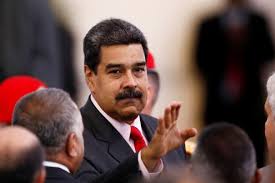
WASHINGTON, Aug 24 (NNN-AGENCIES) — The United States and 10 Latin American countries issued a joint statement rejecting the Venezuela Supreme Court’s certification of President Nicolas Maduro’s July 28 reelection, widely rejected at home and abroad.
The governments of Argentina, Costa Rica, Chile, Ecuador, the United States, Guatemala, Panama, Paraguay, Peru, Dominican Republic and Uruguay said the court’s ruling was invalidated by a “lack of independence and impartiality.”
They said they “categorically reject” the Venezuelan supreme court’s decision to confirm Nicolás Maduro’s widely contested claim to have won re-election, with Chile’s president declaring: “I have no doubt this election has been stolen.”
Thursday’s verdict from Venezuela’s top court, which is stacked with Maduro loyalists, has been widely questioned internationally from across the political spectrum.
In a joint statement published on Friday, the governments of Argentina, Costa Rica, Chile, Ecuador, Guatemala, Panama, Paraguay, Peru, the Dominican Republic, Uruguay and the US called for an “impartial and independent audit” of the vote.
They also voiced “profound concern” over human rights violations committed during Maduro’s post-election crackdown, which activists say has resulted in more than 1,600 people being detained and at least 24 others killed.
Strikingly, the communique was endorsed not just by conservative governments that have long been hostile to Maduro’s purportedly socialist movement, but also by the administration of Chile’s progressive president, Gabriel Boric – now one of the Venezuelan’s most outspoken leftwing critics – and that of Guatemala’s centre-left leader, Bernardo Arévalo.
“We are dealing with a dictatorship that falsifies elections,” Boric said after the supreme court ruling, rejecting the idea that Maduro’s regime was leftwing.
“The Maduro regime is not democratic and we do not recognise its fraud,” tweeted Arévalo.
The US added its voice to the condemnation on Friday claiming the ruling lacked “all credibility, given the overwhelming evidence that [Maduro’s rival Edmundo] González received the most votes” in the 28 July election.
“Continued attempts to fraudulently claim victory for Maduro will only exacerbate the ongoing crisis,” Vedant Patel, a state department spokesperson, told reporters.
The EU foreign policy chief, Josep Borrell, told reporters its 27 member states would not recognise Maduro’s re-election without seeing “a verifiable result”.
Brazil and Colombia – whose leftwing leaders both have warm, historical ties to the political movement Maduro inherited from Hugo Chávez – have also refused to recognise his re-election without seeing detailed voting tallies.
Brazil’s Luiz Inácio Lula da Silva and Colombia’s Gustavo Petro, whose diplomats have been exploring possible ways of defusing the growing crisis, are expected to issue a joint statement later.
Earlier, another leading Latin American leftist, Mexico’s president, Andrés Manuel López Obrador, told reporters he also wanted to see detailed voting tallies before recognising the official result.
Maduro and his allies have rejected international criticism, with Venezuela’s foreign minister, Yván Gil, calling Boric the “laughingstock” of Latin America and a “submissive pawn of North American imperialism”.
As things stand, Maduro, who retains the support of Venezuela’s military as well as the governments of Russia and China, will be sworn in for his third six-year term as president on Jan 10, 2025. — NNN-AGENCIES




